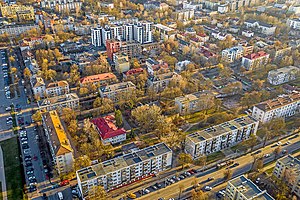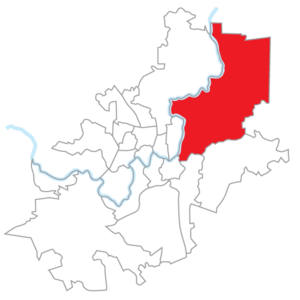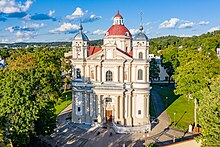
Back Antakalnis Azerbaijani Антокаль BE-X-OLD Antakalnis Danish Antakalnis German Antakalnis Estonian آنتاکالنیس Persian Antakalnis French Antakalnis Lithuanian Antakalna seņūnija Latvian/Lettish Antokol Polish
Antakalnis | |
|---|---|
 Aerial view of Antakalnis | |
 | |
| Country | |
| County | |
| Municipality | Vilnius City Municipality |
| Elder | Mantas Ilgūnas |
| Area | |
| • Total | 77.14 km2 (29.78 sq mi) |
| • Rank | 2nd in (Vilnius) |
| Population (2023 December[1]) | |
| • Total | 43,540 |
| • Density | 564.43/km2 (1,461.9/sq mi) |
| Time zone | UTC+2 (EET) |
| • Summer (DST) | UTC+3 (EEST) |
| Website | antakalnis |



Antakalnis (literally Lithuanian: 'the place on the mountain') is an eldership in Vilnius, Lithuania. Antakalnis is one of the oldest, and largest historical suburbs of Vilnius. It is in the Eastern section of Vilnius, along the left bank of the Neris, with the river running along the whole Western side of the district.[2] Antakalnis Eldership is the second-largest in Vilnius, with an area of 77.14 km2 (29.78 sq mi).
One of the greatest Lithuanian Baroque masterpieces, the Roman Catholic Church of St. Peter and St. Paul, is in Antakalnis, as is Sapieha Palace (Sapiegų rūmai). Sapieha Palace is surrounded by the only surviving Baroque-style park in Lithuania, which contains the oldest linden tree in Vilnius.
Antakalnis is home to the historically important Antakalnis Cemetery, where victims of the January Events in 1991, killed by the Soviet Army, are buried; their graves are often visited, as they are considered national heroes of Lithuania.
Antakalnis Eldership includes the recreational area and prestigious cottage district Valakampiai, where two river beaches have been established. The current and former president of Lithuania, the prime minister of Lithuania, and other state officials reside in the Turniškės neighborhood of Antakalnis.
The Botanical Garden of Vilnius University lies in Kairėnai, the settlement in the Eastern part of the district.
- ^ [1]
- ^ (in Lithuanian) "Vilniaus mikrorajonas Antakalnis" Archived 2015-09-01 at the Wayback Machine Antakalnis eldership official website. Retrieved 25 September 2013.